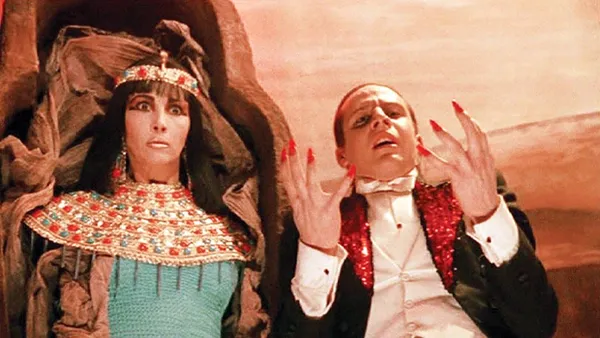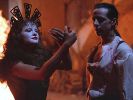Eye For Film >> Movies >> Santa Sangre (1989) Film Review
Santa Sangre
Reviewed by: David Graham

Chilean legend Alejandro Jodorowsky's 1989 gem remains a riot of colour and sensation, fearlessly blurring boundaries like cult predecessors El Topo and The Holy Mountain until the line between trash and art becomes indistinguishable. Jodorowsky claims to write and direct "from his balls" and they're fully on display here, but in a more coherent fashion than in his previous midnight movie head-trips. Despite several grisly sequences and a strong horror component (Claudio Argento acted as producer), Santa Sangre is suffused with rare heart and a sense of aching melancholy, and not a minute of its two hour runtime is wasted.
When her makeshift church in Mexico City is bulldozed by a disapproving Monsignor, 'Holy Blood' cult leader Concha retreats to her circus home, where her alcoholic knife-thrower husband Orgo has been canoodling with the newly arrived tattooed lady. The tempestuous relationship takes its toll on her young magician son Fenix, who is driven insane when he witnesses his parents trying to kill each other. Years later, he is slowly coming out of his shell in a home for people with Down's Syndrome, when Concha reappears and calls upon him to do her murderous bidding. As he ventures back into the world, Fenix stumbles upon Alma, the deaf mute girl with whom he shared his childhood, and romance once again blossoms. However, his twisted, incestuously charged relationship with his mother may destroy any chance he has of happiness.

Flashbacks employ furious mambo rhythms and a swooping eagle's eye view of the circus to carry us back through the painful childhood memories Fenix must work through in order to finally re-emerge as an adult (the bird represents the totem emblazoned on his chest, which has consumed him and left him a squawking, raw fish-devouring animal). Jodorowsky balances wicked energy with intimate detail, affectionately portraying a rarely-glimpsed Mexico City of the magic and mundane. Once on the ground, the film takes on a more plaintive tone during satirical moments of religious devotion, before Jodorowsky attacks the Catholic church for its hypocrisy in denouncing Concha's martyr as blasphemous. While the myth her followers worship is certainly hideously violent, Jodorowsky is obviously undermining the disturbing notion of the crucifixion as something for fanatics to fixate on; all of his films have featured outrageous martyrdom, arguing against the piety Christianity upholds above all other beliefs.
At the circus, a series of outlandish individuals perform for each other and the audience, with a cavalcade of children, midgets and clowns constantly in character watching in awe as Orgo and the tattooed lady indulge in public foreplay. The psycho-sexual element of the plot comes screaming out with the 'love' triangle between Concha and these two, Fenix watching in shock and horror as his mother is hypnotised into animalistic sex while his pet elephant spews torrents of symbolic blood from its phallic trunk.
Fenix's loss of innocence is truly tragic, with a spectacularly surreal funeral procession for the humongous dead animal culminating in a father-to-son rite of passage involving knife-based tattoo work that's somehow both upsetting and moving. Through all of this, the tender interplay between Fenix and his porcelain-faced love Alma counters the anger, perversion and sadness on display elsewhere, Jodorowsky calling upon his own appreciation for and experience in mime to create truly touching scenes of child-like intimacy (helped enormously by the gorgeously carnivalesque score) that double as a requiem for the dying circus lifestyle that's fuelling all this desperate transgression.
As the action moves back to Fenix's present-day situation, his gradual rehabilitation is peppered with imagery both delightful and alarming, from his notorious coke-sniffing cohorts to the cavalcade of freakish street trash he stumbles across during the Day Of The Dead celebrations that form a suitably macabre backdrop to the increasingly morbid action. While Jodorowsky often seems to strive for sensationalism for its own sake, there's no doubting the spell this phantasmagoric but secular journey weaves; he still flirts with the religious imagery prevalent in El Topo and The Holy Mountain (and of course the start of this film), but the focus on Fenix's very personal re-awakening makes this by far his most affecting and heartfelt work.
When the armless Concha returns to have her son do her bidding - whether through their theatrical take on original sin or their matriarchal domestic bond - Jodorowsky takes an even more twisted view of sexuality, where greedy mothers literally smother and stand in the way of their sons' impulses. The physical implications - let alone the psychological - are thoroughly disturbing but never spill over into seediness, while Concha's murderous commandments come in imaginatively gory flourishes that do vivid justice to the Argento producing credit, right down to some garish gel lighting.
The resurfacing romance between Fenix and Alma isn't quite as effective as that between their younger counterparts (in fact, Fenix's friendship with his midget sidekick Aladdin is arguably etched with greater care), but the narrative builds towards a poignant climax that questions the nature of the relationship between body and mind - ultimately, which is in control, and can they ever be reconciled?
Santa Sangre is not a perfect film: a few second-half indulgences fall flat - the transsexual wrestler is particularly poorly handled - and some of the imagery slips into obvious cliche (do we really need to see Fenix as yet another Christ figure, or wrestling with a huge snake emanating from his crotch?). It is, however, arguably Jodorowsky's most accessible and well-rounded work, which makes it a great starting point for the uninitiated but perhaps a lesser entry in the canon for those who prefer his more esoteric and incendiary Seventies classics.
The bewildering variety of performances - from Axel Jodorowsky's vacant lost soul to Blanca Guerra's unhinged mania and Guy Stockwell's cartoony posturing - will alienate some viewers (although Jodorowsky's son Adan makes an excellent young Fenix in a nice piece of nepotistic casting), while the sheer volume of visual madness may distract others from the surprisingly elegant narrative (it's basically a bittersweet Romeo And Juliet romance, with nuttily explicit allusions to Universal horrors such as The Invisible Man and The Mummy thrown into the mix). No matter how you respond to its excesses though, there are a wealth of endlessly intriguing themes and memorable vignettes to digest as well as a timeless growing pains tale (who hasn't had a mother like Concha at some point?), making Santa Sangre an exceptionally rewarding viewing experience the likes of which is too rarely seen.
Reviewed on: 12 Feb 2013

















